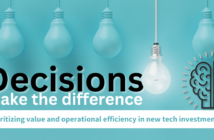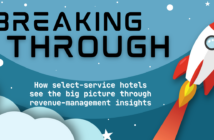Marketing strategies for an unpredictable world
The effects the pandemic has had on the travel industry are immeasurable. Never-before-seen challenges and technological innovations emerged, and global legislation and policy largely governed the travel industries, while many hoteliers adapted advanced solutions to support social-distancing protocols. As hoteliers begin to navigate the sector’s recovery, aiming to stand out from competitors in an increasingly competitive era, one pressing challenge has emerged: How do hoteliers market to the post-pandemic traveler?
The behavior of today’s consumers has been radically shifted by COVID-19, a change that is certain to impact marketing strategies for years to come. Guests are increasingly prioritizing contactless amenities and relaxed cancellation policies, and responding more positively to increased engagement and inspirational content, which gives hoteliers insight into what their new marketing strategy may look like. But as the pandemic continues to impact the market, consumer behaviors will only continue to shift.
Properly adapting to the rapidly evolving needs of the post-COVID traveler will be no easy task, as hoteliers can no longer rely on historical data to deliver the demand insights necessary for successful marketing strategies. Instead, hoteliers should pivot to using predictive forecasting from forward-looking data. By harvesting and aggregating data from a variety of sources, hoteliers can gain a valuable glimpse into the first signs of a shifting market, including emerging behaviors and trends, and accordingly adjust their marketing strategies.
VITAL MARKETING
The recent disruptions in the hospitality market mean that using historical data can offer a misleading perspective. The key benefit of utilizing predictive forecasting is that its data is rooted in current market trends, helping hoteliers understand how traveler intent is actively fluctuating. With this information, hoteliers can navigate a rapidly shifting market to make more informed decisions.
The effects of COVID-19 are still rattling the industry as new outbreaks, changes in travel restrictions, and vaccine rollouts drastically impact demand across the globe. Hoteliers must keep a constant eye on the shifting market and ensure marketing efforts are targeted toward areas of high demand. With predictive forecasting, hoteliers can continually utilize real-time market intelligence, including elements such as vaccine distribution rollouts and social-distancing measures, to capitalize on even the most minute market changes. Armed with insights into commonly emerging booking dates, lengths of stay, and traveler intent from predictive forecasting, hoteliers can create marketing strategies that target regions experiencing high demand and specific traveler demographics, ensuring boosted revenue and a higher ROI.
FORWARD-LOOKING DATA
Predictive forecasting relies on forward-looking data, which is comprised of several different sources. Its foundation is always a hotel’s existing reservations, which can provide hoteliers with an in-depth analysis of the vital demographics involved in realized sales, such as the geographical origin of a booking, duration of stay, and dates booked. The volume of hotel queries on search engines and OTAs is an additional crucial factor, offering insight into shifting trends and emerging demands. Although these don’t always lead to bookings, they can give hoteliers an idea of a traveler’s intent and potential booking patterns. Additional parameters used to create a complete picture of the current market and subsequently predict future trends can include competitor insights and GDS bookings.
To gather forward-looking data points, track global recovery, and spot early signs of demand, hoteliers can harness free insight tools available through search engines and industry-leading marketing solution providers. Integrating advanced marketing software can additionally provide reliable insights based on real-time demand, equipping hoteliers with the tools necessary to create an actionable marketing plan. Using this information, marketing teams can refine their strategies and develop personalized promotions and offers based on real-time demand. With key source markets identified, geotargeted advertising campaigns can not only drive further revenue but also ensure that market budgets are allocated to promote a high ROI.
Powerful data solutions can provide hoteliers with expert support in sifting through unnecessary data points, which can dilute the reliability of a forecast. When choosing a new data solutions tool, hoteliers should ensure that the technology can integrate seamlessly, alleviate manual workloads, and guide hotels to better, more data-driven decisions. Additionally, partnering with a data solutions provider can help hoteliers develop a proactive, data-driven strategy that perfectly positions their properties to succeed in the new business environment by seizing upon emerging marketing opportunities before the ability to respond is missed.





